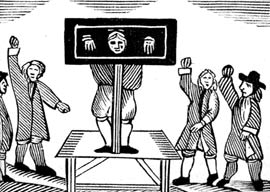
March 24, 2014

Like all societies before it, our society considers nothing more shameful than to be shameless. Thus, the Internet”which binds our society together like cheese binds a colon”is crammed with so much public shaming, it should be ashamed of itself.
Sticking your fist into the electronic beehive, you will be bitten by a thousand types of public shaming: age-shaming v. youth-shaming, slut-shaming v. virgin-shaming, fat-shaming v. skinny-shaming, and poor-shaming v. wealth-shaming. You will find liberals shaming liberals in the ongoing intersectionality wars, resulting in gay-on-gay shaming and black-on-black shaming.
Ain’t that a shame? Yes, it is. It’s a shame indeed, but don’t expect the public shamers to feel ashamed of their public shaming. Have they no shame? No, not for themselves. Like all moralists, they exist only to shame others.
Public shaming is nothing new. It has long and ignoble history, from Roman crucifixions to the Spanish Inquisition to the “shame societies” of China (with its psychotic and murderous struggle sessions) and Japan (with its ritual of seppuku which, though self-directed, is often spurred by a suicidal sense of social shame). Every self-justifying social organism”i.e., all of them”puts its outliers and miscreants through some form of hairshirts, dunce caps, perp walks, and tarring and feathering, and they never seem to feel ashamed of indulging in such cruel and depressingly typical rituals, at least not while it’s happening. Societies only seem capable of coming to terms with their collective potential for cruelty when it is too late to do anything about it. Thus, Americans still shed tears about Emmett Till and the Scottsboro Boys while turning a blind eye to modern black flash mobs.
Puritan New England remains infamous for its public stockades and witch trials and coldhearted shunning of anyone who dared deviate from the rigidly humorless social norm. This colonial culture of shaming was immortalized two centuries later in Nathaniel Hawthorne’s The Scarlet Letter, where accused adulteress Hester Prynne was forced to wear a red “A” on her dress as a lifelong emblem of shame.
Those who foolishly believe that history is linear rather than cyclical seem to feel that we’ve progressed past such shaming rituals. After all, adultery is no longer a shunning offense; in some circles, it’s a matter of pride.
And it’s true that America’s legal system no longer dunks witches in water or places offenders in the stocks for passersby to hurl rotten fruit at them. But it still exists in the form of judges sentencing petty offenders to public-humiliation rituals where they are forced to stand in public wearing sandwich boards declaring their crime.
Outside the legal system, our reputedly “progressive” society has merely swapped out the scarlet “A” for a scarlet “R,” a scarlet “S,” and a scarlet “H”“sometimes all three at once. Modern social-justice warriors, those little mob-motivated creeps, justify their behavior with the excuse that at least this time around, they’re fighting for an irrefutably righteous cause.
Sure. That’s what they all say.